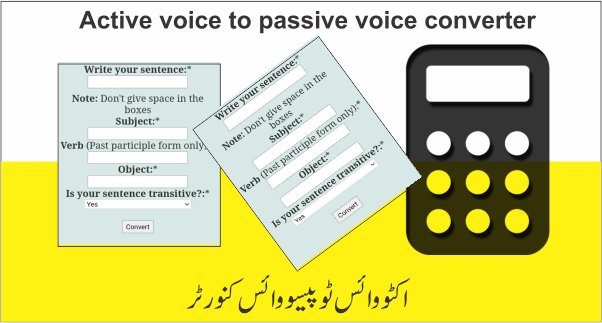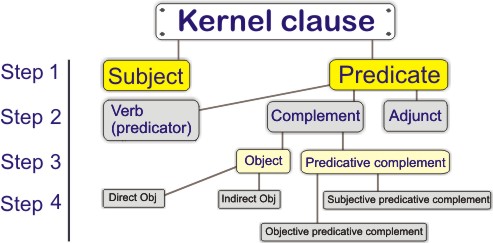|
Kernel is edible cure of a nut or any fruit therefore kernel clause means the basic clause.
It must have the following characteristics; 1. Simple affirmative sentence neither negative
nor interrogative. In order to dig deep into kernel clause it will be very useful to first look at the following chart. Here we have explained everything in step wise manner and once you analyse it you will understand more clearly. The kernel clause is four-level deep as shown in the image below.
Step 1: Subject and predicateKernel clause is the combination of subject and predicate. Subject is noun phrase whereas predicate is verb phrase. Now look at the following sentence. The man is calling you.
The man is subject and it is noun phrase because of man as a head and calling you acts as verb phrase because of the verb (calling) which is the head and the pronoun [you] acts as its dependent. Clause is always formed by noun phrase (subject) and verb phrase (predicate). Predicate is further divided into three things verb (predicator), complement and adjunct. Note: To read about phrases, head and dependent you must go to the chapter of phrases. Step 2: Verb, complement and adjunctMain verb in a sentence or clause is called predicator because it is the head of predicate (most important information in predicate) whereas complement and adjunct are its dependents. It is predicator that complements are in agreement of, e.g. with the verb read you can use book, newspaper, novel etc as complement. It means you have to use what the main verb (predicator) suggests. Complement is direct dependent of verb in a sentence. It is either object or predicative complement. Both are explained in step 3. ExampleHe refused my invitation yesterday. In above sentence “refused my invitation yesterday.”is predicate where refused is verb or predicator, my invitation is complement and yesterday is adjunct. Adjunct is adverb and additional part of a sentence or clause. Sentence or clause is made even without that, like, He refused my invitation. In some cases adjunct may come at the beginning, like, Yesterday he refused my invitation. Object and predicative complement are complements which are explained below. Step 3: Object and predicative complementObject has following characteristics. It is patient to which the verbal action is transferred, like, “He knocks at the door.” Here the door receives verbal action therefore it is patient and object. Object is noun or noun phrase, like, in the above sentence the door is noun phrase where door is noun it is important information and therefore head of the phrase. The characteristics of predicative complement are as follows. Predicative complement is not patient. It doesn’t receive any verbal action rather the verb used with it is copula, like, “he is a good man.” Here good man is not receiving any verbal action nor there is any action. No predicator or main verb is used rather copula (is). Predicative complement can either be noun phrase as mentioned in above example (good man) or adjective, like, “he is honest.” Here the word honest is adjective. Object is divided into direct and indirect object whereas predicative complement is further divided into subjective and objective predicative complement as explained below.
Step 4 (a): Direct and indirect objectDirect object is directly related to the verb than indirect object. Look at the following example. He bought a book for me. Now you see that book is direct object because it is related to buying (verb in above sentence) whereas me has no relation with buying that is why it is indirect object. The above sentence can also be written as “He bought me a book.” where indirect object comes first. Direct object is either noun or noun phrase whereas indirect object is pronoun. Step 4 (b): Objective and subjective predicative complementPredicative complement has already been defined in step 3. Subjective predicative complement, as the name indicates, is related to subject, like, He is intelligent. You see the predicative complement (intelligent) is related to [he] which is subject. Similarly objective predicative complement is related to object, like, We consider him intelligent. Now the same predicative complement (intelligent) stands for [him] which is object. Watch the video |


